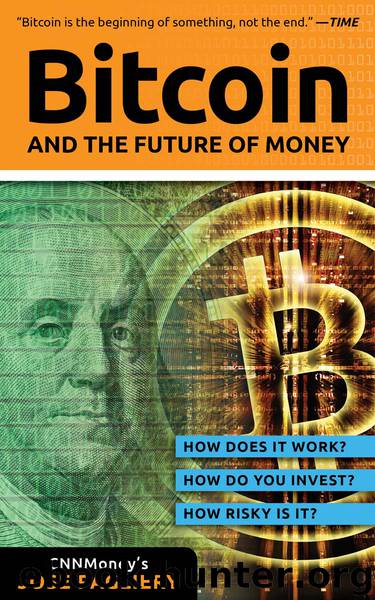Bitcoin by Pagliery Jose

Author:Pagliery, Jose
Language: eng
Format: epub
Publisher: Triumph Books
Published: 2014-08-15T04:00:00+00:00
A Runaway Inflation Escape Pod
If there’s one reason above all others why Bitcoin is a Libertarian dream, it’s because the currency is independent of state control. No government determines how many bitcoins are produced. The system regulates itself. It’s a simple concept, but it’s attempting the biggest power grab in modern financial history. Rogue money is as antiauthority as it gets.
Governments everywhere jealously guard their currencies, because it gives them economic control. The license to create and destroy money is powerful. It affects prices and interest rates, which collectively determine how you get paid, buy things, save money, and invest. That covers just about everything in the economy.
The ones in charge of this task are central bankers. To them, the nation’s economy is akin to a machine. To keep it working properly, buttons must be pushed. Levers must be pulled. The most important gauge is the supply of money. That’s the fuel. If the economy gets too slow, they hit the gas pedal and pump more petrol into the engine. If it’s going too fast, they cut off the fuel and hit the brakes. This control gives central bankers the ability to steer the economy—and avert financial disaster.
When they flood the system with cash, we can thank them for the economic policies that create easy money and lower interest rates: abruptly making our salaries higher and home loans affordable. We can also curse them when those same policies make cheeseburgers more expensive and our savings accounts lose their value. That rise in prices is inflation, the manmade economic condition that comes from the devaluing of your dollar. You could say it’s like a hangover. We’re addicted to the immediate high of easy money, and we pay for it later with a case of delirium tremens.
This authority has almost always belonged exclusively to governments, but there have been brief periods in which independent institutions have had their own money. Just over a century ago, it was common for a bank to create its own notes that represented value stored in a vault somewhere. This started to change in the late 1800s, when national governments around the globe awarded specific banks a special privilege: the right to issue notes for the entire country.45 Since then, central bankers have led us into booms and busts that—depending on whom you ask—make them heroes or villains.
There are those who question whether central banks should even have this power. Their voices grew even louder after the Great Recession of 2007–2009, because governments were seen as complicit in fueling the housing bubble. As the United States gripped with the aftermath of a period of easy money, the policies were criticized by two distinct groups on opposite ends of the political spectrum: the Tea Party on the far right and the Occupy movement on the far left. While they disagreed vehemently on immigration policy and state funding of welfare programs, they both came to the conclusion that the federal government had abused its monopoly on the supply of money.
Download
This site does not store any files on its server. We only index and link to content provided by other sites. Please contact the content providers to delete copyright contents if any and email us, we'll remove relevant links or contents immediately.
Rich Dad Poor Dad by Robert T. Kiyosaki(6632)
Bad Blood by John Carreyrou(6621)
Principles: Life and Work by Ray Dalio(6447)
Playing to Win_ How Strategy Really Works by A.G. Lafley & Roger L. Martin(6305)
Management Strategies for the Cloud Revolution: How Cloud Computing Is Transforming Business and Why You Can't Afford to Be Left Behind by Charles Babcock(4573)
The Confidence Code by Katty Kay(4260)
Thinking in Bets by Annie Duke(4227)
American Kingpin by Nick Bilton(3886)
Delivering Happiness by Tony Hsieh(3425)
Project Animal Farm: An Accidental Journey into the Secret World of Farming and the Truth About Our Food by Sonia Faruqi(3221)
The Power of Habit by Charles Duhigg(3139)
The Tyranny of Metrics by Jerry Z. Muller(3072)
The Marketing Plan Handbook: Develop Big-Picture Marketing Plans for Pennies on the Dollar by Robert W. Bly(3062)
Brotopia by Emily Chang(3054)
Mastering Bitcoin: Programming the Open Blockchain by Andreas M. Antonopoulos(3045)
I Live in the Future & Here's How It Works by Nick Bilton(2997)
The Content Trap by Bharat Anand(2926)
Building a StoryBrand by Donald Miller(2915)
Applied Empathy by Michael Ventura(2904)
